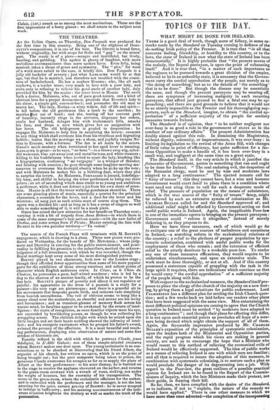The season of the French Plays will terminate with M.
BonFri's engagement, which is drawing to a close. Three new pieces were pro- duced on Wednesday, for the benefit of Mr. MITCHELL; whose judg- ment and liberality in catering for the public entertainment, and punc- tuality in fulfilling his promises to the subscribers, merited the acknow- ledgment of a full attendance, with which he was rewarded, though the Royal marriage kept away some of his most distinguished patrons. BotrivE played in two characters, both new to the London stage ; though they afforded fewer opportunities than some of his more popular parts for the exhibition of those strong emotions and salient points of character which English audiences crave. In Cesar, ou le Chien du Chateau, he personates a poor, half-witted wanderer ; who is led by a dog to the chateau of an ancient family, of which be proves to be the lost heir. BM:1E1'ES picture of poverty and idiocy is not repulsive or painful his appearance in the dress of a peasant is a study for a painter--his very rags are picturesque ; and there is a graceful air in his movements that bespeaks gentle birth, and redeems rude simplicity from boorish uncouthness. The veil of oblivion seems to hang like a sunny cloud over the scatterbrain, so cheerful and serene are his levity and insouciance ; and as transient gleams of memory flash across his vacant mind, its faculties appear to be awakened by the return of intel- ligence: the starts of recognition, as once-familiar objects meet his eye, are succeeded by bewildering pauses, as though he was collecting his straggling senses. The childish delight with which he seized upon the little images and set their heads nodding showed the infirmity of intel- lect; and his energetic excitement when he grasped his father's sword, evinced the potency of the affections. It is a most beautiful and touch- ing performance, displaying nice observation of nature and some fine strokes of histrionic art.
Equally relined is the skill with which he portrays Claude, jeune thiologien, in L'Abbe Galant; one of those simple-minded creatures whom BourEi makes one doat upon. The young ecclesiastic is so con- scientious as to be shocked at discovering that his friend Albert, the organist of his church, has written an opera, which is on the point of being brought out ; but the poor composer being taken to prison, the generous Claude overcomes his scruples so far as to supply the place of Albert at the first performance : to his niter dismay, he is hurried on to the stage to receive the applause showered on the author, and returns to the green-room crowned with a wreath of roses, sinking, not under the weight of honours, but the enormity of his transgression. The scene in the green-room, where the ecclesiastic officiates for the author, and is embroiled with the performers and the manager, is not the less amusing for the quiet, earnest gravity of BOUFFE : he is never tempted to indulge in buffoonery; and his seeming unconsciousness of the ludi- crous situation heightens the drollery as well as marks the truth of the personation.


























 Previous page
Previous page